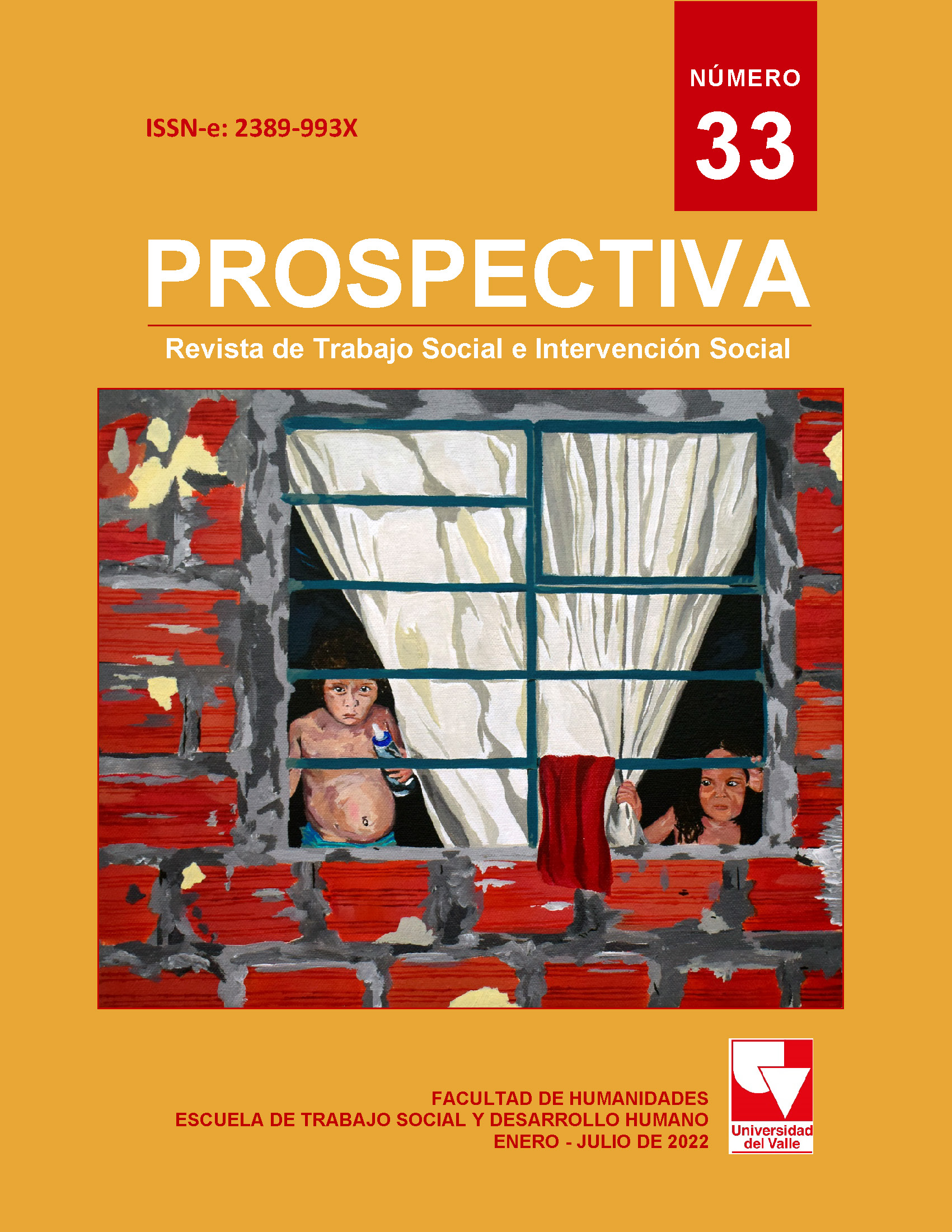Experience of the Family Intervention Process of the Participating Actors in the School for Families of the ICBF-Jamundí, Colombia
Main Article Content
This article contains the results of the systematization process of the School for Families, carried out at the Colombian Institute of Family Welfare in the Centro Zonal Jamundí, during the years 2018-2019. This systematization was developed with the purpose of recovering, interpreting and contributing to the process, giving a voice to the subjects who participated in the experience (families, practitioner and professionals). The collection of information and the analysis was built from interviews and micro-stories, which were subsequently interpreted in light of the theory.
The systematization yielded some results such as the importance of institutional and interdisciplinary articulation based on family intervention processes, the specificity of social work, and the scope in the recovery of experiences from the subjects to generate meaningful knowledge and learning. The initial approach offered knowledge about the fundamental elements of the experience, and the process went back to the pre-professional practice at the community level, experienced by the social work students of the Antonio Jose Camacho University Institution in the practice center.
- Systematization of experiences
- Family development
- Family intervention
- Social work
Barnechea-García, M., y Morgan-Tirado, M. (2010). La sistematización de experiencias: producción de conocimientos desde y para la práctica. Tendencias & Retos, (15), 97-107. Recuperado de http://www.ts.ucr.ac.cr/binarios/tendencias/rev-co-tendencias-15-07.pdf.
Cifuentes-Gil, R. M. (2016). Sistematización de Experiencias en Trabajo Social: Desafío Inminente e Inaplazable. Recuperado de https://cepalforja.org/sistem/bvirtual/wp-content/uploads/2016/10/Sistematizaci%C3%B3n-de-exps-en-TS-desaf%C3%ADo-Inminente-e-inaplazable-RMCG-dic-010.pdf.
Cifuentes-Gil, R. M., y Camelo, A. (2005). Aproximaciones a la comprensión del Trabajo Social: línea de construcción disciplinar Facultad de Trabajo Social de la Universidad de La Salle. Tendencias & Retos, (10), 65-85.
Ghiso, A. (1998). De la práctica singular al diálogo con lo plural. Aproximaciones a otros tránsitos y sentidos de la sistematización en épocas de globalización. Recuperado de https://cepalforja.org/sistem/bvirtual/?p=661.
Instituto Colombiano de Bienestar Familiar [ICBF]. (2010). Líneas de Acción para el trabajo con familias en el ICBF por grupos etarios. Bogotá, Colombia: ICBF
Instituto Colombiano de Bienestar Familiar [ICBF]. (2019). El instituto. Recuperado de https://icbf.gov.co/instituto.
Ministerio de Salud y Protección Social. (2016). Política Pública de apoyo y fortalecimiento a las familias. Bogotá, Colombia: Minsalud. Recuperado de https://www.icbf.gov.co/sites/default/files/politica_de_apoyo_y_fortalecimiento_a_las_familias-marzo2018.pdf.
Schnitman, D. F. (2008). Diálogos generativos. En G. Rodríguez-Fernández (Coord.), Diálogos Apreciativos: el socioconstruccionismo en acción (pp. 17-48). España: Dykinson.
Torres-Carrillo, A. (2010). Educación Popular y producción de conocimiento. La Piragua, (32), 8-25. Recuperado de https://ceaal.org/images/stories/LaPiragua/la%20piragua%2032%20v.pdf.
Weick, K. E. (1995). Sensemaking in Organizations. Thousand Oaks, Estados Unidos: SAGE.
Downloads
Accepted 2021-12-20
Published 2022-01-01

This work is licensed under a Creative Commons Attribution-NonCommercial-ShareAlike 4.0 International License.
Authors who publish in this journal agree to the following terms:
- Authors assign the patrimonial rights to the journal and to Universidad del Valle on accepted manuscripts, but may make any reuse they deem pertinent for professional, educational, academic or scientific reasons, in accordance with the terms of the license granted by the journal to all its articles.
The journal publishes articles under the Creative Commons BY-NC-SA 4.0 (Attribution-NonCommercial-ShareAlike 4.0 International) license.





